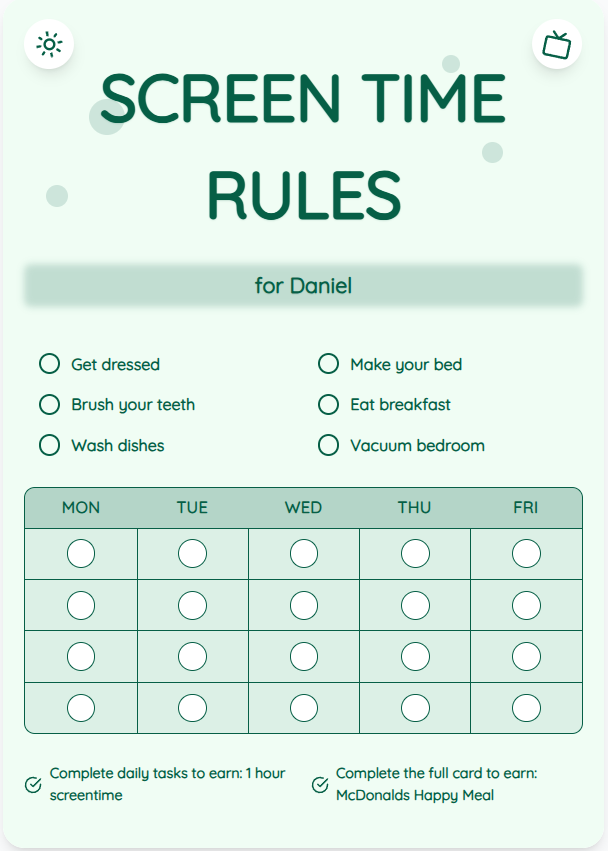Understanding the Impact of Screen Time on Children
In today's digital age, children are increasingly exposed to screens, but excessive screen time can have detrimental effects on their physical, mental, and emotional well-being. As parents, it's crucial to understand why screen time is bad for kids and implement strategies to promote a balanced lifestyle.
See What Your Screen Time Chart Will Look Like
Here's an example of a beautiful, customizable screen time rules chart you can create for your family

Physical Health Concerns
Excessive screen time has been linked to sedentary behavior, obesity, and poor sleep quality in children. Prolonged sitting and exposure to blue light emitted by screens can impact their eyesight and posture. Encouraging outdoor play and setting screen time limits can help mitigate these risks.
Cognitive Development Challenges
Studies suggest that excessive screen time can hinder cognitive development in children, affecting their attention span, problem-solving skills, and academic performance. Limiting screen time and engaging in activities that stimulate creativity and critical thinking are essential for healthy brain development.
Put These Tips Into Action
Create a custom chart to implement these strategies with your child
Social and Emotional Impacts
Extended screen time can lead to social isolation, communication difficulties, and emotional regulation issues in children. Prioritizing face-to-face interactions, fostering empathy, and teaching digital citizenship can help children develop meaningful relationships and emotional intelligence.
Practical Tips for Success
- Set clear screen time rules and boundaries
- Encourage alternative activities such as reading, arts, and outdoor play
- Use screen time management tools like screen time charts
- Lead by example and limit your own screen time
Frequently Asked Questions
How much screen time is considered excessive for kids?
The American Academy of Pediatrics recommends limiting screen time to 1 hour per day for children aged 2-5 and ensuring that screen time does not interfere with adequate sleep, physical activity, and other healthy behaviors.
Can educational apps and programs be beneficial for children?
While some educational content can be valuable, moderation is key. It's important to balance screen time with hands-on learning experiences and real-world interactions to promote holistic development.
How can parents create a screen time schedule for their children?
Utilizing screen time charts or apps can help parents establish a consistent schedule for screen use, allocate time for educational content, and encourage breaks for physical activity and social interactions.
By understanding the negative impacts of excessive screen time on children and implementing practical strategies to manage it effectively, parents can promote healthy development and strengthen family relationships. Visit ScreenTimeRules.com to create personalized screen time charts that support your family's well-being.
Ready to Transform Your Family's Screen Time?
Join thousands of parents who have successfully managed screen time with our customizable charts.
